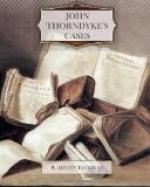“Our old friend Inspector Badger,” said Thorndyke. “He seems mightily interested in that gentleman in the light overcoat. How d’ye do, Badger?” for at this moment the detective caught his eye and bowed. “Who is your friend?”
“That’s what I want to know, sir,” replied the inspector. “I’ve been shadowing him for the last half-hour, but I can’t make him out, though I believe I’ve seen him somewhere. He don’t look like a foreigner, but he has got something bulky in his pocket, so I must keep him in sight until the Duke is safely past. I wish,” he added gloomily, “these beastly Russians would stop at home. They give us no end of trouble.”
“Are you expecting any—occurrences, then?” asked Thorndyke.
“Bless you, sir,” exclaimed Badger, “the whole route is lined with plain-clothes men. You see, it is known that several desperate characters followed the Duke to England, and there are a good many exiles living here who would like to have a rap at him. Hallo! What’s he up to now?”
The man in the light overcoat had suddenly caught the inspector’s too inquiring eye, and forthwith dived into the crowd at the edge of the pavement. In his haste he trod heavily on the foot of a big, rough-looking man, by whom he was in a moment hustled out into the road with such violence that he fell sprawling face downwards. It was an unlucky moment. A mounted constable was just then backing in upon the crowd, and before he could gather the meaning of the shout that arose from the bystanders, his horse had set down one hind-hoof firmly on the prostrate man’s back.
The inspector signalled to a constable, who forthwith made a way for us through the crowd; but even as we approached the injured man, he rose stiffly and looked round with a pale, vacant face.
“Are you hurt?” Thorndyke asked gently, with an earnest look into the frightened, wondering eyes.
“No, sir,” was the reply; “only I feel queer—sinking—just here.”
He laid a trembling hand on his chest, and Thorndyke, still eyeing him anxiously, said in a low voice to the inspector: “Cab or ambulance, as quickly as you can.”
A cab was led round from Newman Street, and the injured man put into it. Thorndyke, Badger, and I entered, and we drove off up Rathbone Place. As we proceeded, our patient’s face grew more and more ashen, drawn, and anxious; his breathing was shallow and uneven, and his teeth chattered slightly. The cab swung round into Goodge Street, and then—suddenly, in the twinkling of an eye—there came a change. The eyelids and jaw relaxed, the eyes became filmy, and the whole form subsided into the corner in a shrunken heap, with the strange gelatinous limpness of a body that is dead as a whole, while its tissues are still alive.
“God save us! The man’s dead!” exclaimed the inspector in a shocked voice—for even policemen have their feelings. He sat staring at the corpse, as it nodded gently with the jolting of the cab, until we drew up inside the courtyard of the Middlesex Hospital, when he got out briskly, with suddenly renewed cheerfulness, to help the porter to place the body on the wheeled couch.




